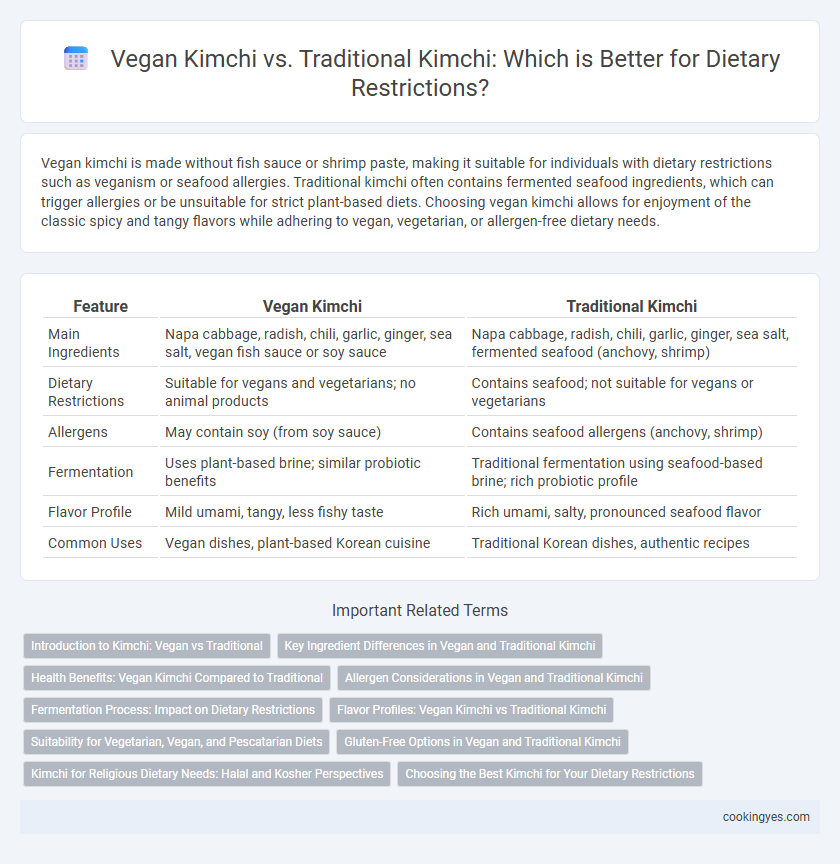Vegan kimchi is made without fish sauce or shrimp paste, making it suitable for individuals with dietary restrictions such as veganism or seafood allergies. Traditional kimchi often contains fermented seafood ingredients, which can trigger allergies or be unsuitable for strict plant-based diets. Choosing vegan kimchi allows for enjoyment of the classic spicy and tangy flavors while adhering to vegan, vegetarian, or allergen-free dietary needs.
Table of Comparison
| Feature | Vegan Kimchi | Traditional Kimchi |
|---|---|---|
| Main Ingredients | Napa cabbage, radish, chili, garlic, ginger, sea salt, vegan fish sauce or soy sauce | Napa cabbage, radish, chili, garlic, ginger, sea salt, fermented seafood (anchovy, shrimp) |
| Dietary Restrictions | Suitable for vegans and vegetarians; no animal products | Contains seafood; not suitable for vegans or vegetarians |
| Allergens | May contain soy (from soy sauce) | Contains seafood allergens (anchovy, shrimp) |
| Fermentation | Uses plant-based brine; similar probiotic benefits | Traditional fermentation using seafood-based brine; rich probiotic profile |
| Flavor Profile | Mild umami, tangy, less fishy taste | Rich umami, salty, pronounced seafood flavor |
| Common Uses | Vegan dishes, plant-based Korean cuisine | Traditional Korean dishes, authentic recipes |
Introduction to Kimchi: Vegan vs Traditional
Kimchi is a traditional Korean fermented dish primarily made from napa cabbage and a variety of seasonings, known for its rich probiotic content that supports gut health. Vegan kimchi substitutes fish sauce or shrimp paste with plant-based alternatives like seaweed or fermented soy, making it suitable for those adhering to vegan, vegetarian, or seafood allergy diets. Traditional kimchi contains animal-derived ingredients, which may conflict with dietary restrictions related to veganism, pescatarianism, or specific religious practices.
Key Ingredient Differences in Vegan and Traditional Kimchi
Vegan kimchi replaces fermented fish sauce or shrimp paste found in traditional kimchi with soy sauce, miso, or seaweed-based alternatives to maintain umami flavor while adhering to plant-based diets. Traditional kimchi's key ingredients include salted seafood, which contributes probiotics and a distinctive taste but may not suit vegan or allergen-sensitive individuals. The substitution in vegan kimchi ensures compatibility with dietary restrictions while preserving beneficial fermentation qualities.
Health Benefits: Vegan Kimchi Compared to Traditional
Vegan kimchi, made without fish sauce or shrimp paste, offers a plant-based alternative that fits stricter dietary restrictions such as vegetarian or vegan diets while providing probiotics essential for gut health. Traditional kimchi retains higher levels of umami from fermented seafood ingredients, which can enhance nutrient absorption but may not suit those with allergies or sensitivities. Both versions are rich in vitamins A, B, and C, antioxidants, and dietary fiber, promoting digestion and supporting immune function, but vegan kimchi ensures broader accessibility without compromising these health benefits.
Allergen Considerations in Vegan and Traditional Kimchi
Vegan kimchi is free from fish sauce and shrimp paste, common allergens in traditional kimchi, making it suitable for individuals with seafood allergies. Traditional kimchi typically contains ingredients like anchovy or brine shrimp, which can trigger allergic reactions in sensitive individuals. Choosing vegan kimchi helps avoid these allergens while still providing the probiotic benefits of fermented cabbage.
Fermentation Process: Impact on Dietary Restrictions
Vegan kimchi uses plant-based ingredients without fish sauce or shrimp paste, making its fermentation process suitable for strict plant-based diets and those with seafood allergies. Traditional kimchi relies on seafood-based fermenting agents, which contribute to its umami flavor but limit its suitability for vegans and individuals with shellfish sensitivities. The fermentation process in vegan kimchi adapts by employing kombu or miso, maintaining probiotic benefits while aligning with dietary restrictions.
Flavor Profiles: Vegan Kimchi vs Traditional Kimchi
Vegan kimchi offers a vibrant, tangy flavor derived from fermented vegetables and spices without fish sauce, resulting in a milder umami taste compared to traditional kimchi. Traditional kimchi's distinct complexity comes from fermented seafood ingredients like anchovy or shrimp paste, enhancing its rich, pungent depth preferred by many. Those with dietary restrictions often choose vegan kimchi for its clean, plant-based profile while still enjoying authentic Korean flavors.
Suitability for Vegetarian, Vegan, and Pescatarian Diets
Vegan kimchi excludes fish sauce and animal-derived ingredients, making it suitable for vegetarian, vegan, and pescatarian diets. Traditional kimchi often contains fermented fish or shrimp paste, which may not align with strict vegetarian or vegan restrictions but can be acceptable for pescatarians. Those adhering to vegan or vegetarian lifestyles should verify ingredient labels to ensure the kimchi meets their dietary requirements.
Gluten-Free Options in Vegan and Traditional Kimchi
Vegan kimchi offers a gluten-free advantage by omitting fish sauce and other traditional ingredients that may contain gluten, making it suitable for those with gluten sensitivities or celiac disease. Traditional kimchi often includes gluten-containing soy sauce or fermented shrimp paste, which can pose challenges for gluten-free diets. Both vegan and traditional varieties can be adapted with certified gluten-free ingredients to meet strict dietary restrictions without compromising flavor.
Kimchi for Religious Dietary Needs: Halal and Kosher Perspectives
Vegan kimchi aligns more easily with Halal and Kosher dietary laws as it avoids non-permissible seafood ingredients commonly found in traditional kimchi recipes, such as salted shrimp or fish sauce. Traditional kimchi may require careful ingredient verification and certification to meet Halal or Kosher standards due to the inclusion of animal-derived additives. For Muslim and Jewish consumers adhering to religious dietary restrictions, selecting certified vegan kimchi ensures compliance with Halal and Kosher dietary requirements.
Choosing the Best Kimchi for Your Dietary Restrictions
Vegan kimchi excludes fish sauce and shrimp paste, making it suitable for strict vegetarian or vegan diets, while traditional kimchi relies on fermented seafood for its signature flavor and probiotics. Those with dietary restrictions involving animal products or allergens should opt for vegan kimchi to avoid potential reactions. Evaluating ingredients and fermentation methods ensures selecting kimchi that aligns with individual dietary needs and health goals.
Vegan kimchi vs Traditional kimchi for dietary restrictions Infographic

 cookingyes.com
cookingyes.com